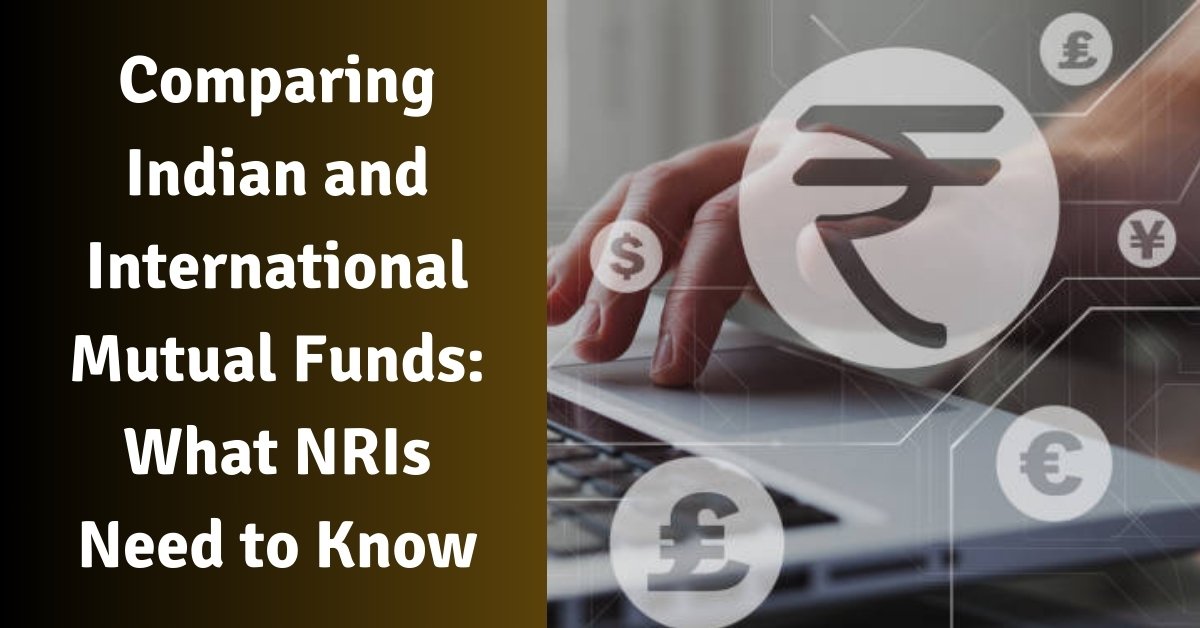How to Invest in Indian Mutual Funds After Returning from Abroad?
Investing money in the right kind of asset can help you achieve your financial goal faster and more efficiently. Specially NRIs have a broad idea about the economy of other countries but with India having emotional connect and knowing that it is the fastest developing country. As predicted by various economists like Jim Walker and Nirmala Sitharaman etc, and organizations like the World Bank and IMF etc, Indian markets are going to be very profitable for the investors due to the emerging small and mid cap industry. Here is how you can profit from the Indian market by investing in Indian Mutual Funds. Update your residency status When you transition back to India, it is important to notify a change of your residential status both to your bank as well as with the Income Tax Department. You will be liable for taxation under Indian law, based on whether you are Resident or not. You can fall under Resident category if you are a resident in India for 182 days or more in a financial year. Otherwise, you might be considered Resident but Not ordinary resident (RNOR) for a brief transitional period. If you are still an NRI according to Non-Resident status requirements, then you remain an NRI. Why should you care? Because your mutual fund taxation, investment eligibility, and bank account types all depend on this classification. Make sure to report your new residential status first. Change Your Bank Accounts Once you return to India, you can no longer maintain NRE (Non-Resident External) or NRO (Non-Resident Ordinary) accounts. These will need to be transferred to regular Resident Savings Accounts. If you wish to maintain your foreign earnings in Indian rupees, a Resident Foreign Currency (RFC) Account can be opened. You are able to maintain money in another currency than your own in this account and is best suited for those who feel that someday or the other they will require money overseas. You need to also link your changed bank account with your mutual fund folios for transactional reasons like redemptions, SIPs, and switches. Failing to do so may result in inviting delays and compliance-related problems. Update your KYC Details KYC (Know Your Customer) compliance is mandatory for all mutual fund investors in India. If your residential status or address has been altered, updating your KYC with the updated personal information is necessary. These include your new residential address, local telephone number, and PAN card information. You will have to give identity and address proof, such as an Aadhaar card, passport, or a bill. You can do this in any mutual fund office, registrar office such as CAMS or KFintech, or from a KYC Registration Agency (KRA). A recent KYC gives easy access to your investments and new fund options. Review Your Portfolio and Risk Profile Returning to India typically means that there is a shift in way of life and financial goals. You may now be saving for education in India for a child, saving for real estate, or saving for retirement here. New goals call for a review of the existing mutual fund investments you hold. If your portfolio is made of global or NRI-focused funds, you would prefer to switch to domestic equity, hybrid, or debt funds. Your horizon, income needs, and risk tolerance would have also changed, and your investments must be re-tuned accordingly. Having a new view on your portfolio helps you align your money with your new goals in life. A financial advisor will be able to lead you to make strategic shifts and rebalance investments effectively. Taxation Rules for Returning NRIs As a repeat NRI, your investments will now be taxed under resident rules. Equity mutual fund gains that are held for more than one year will be taxed under long-term capital gains tax at 10 percent. Redemptions within a year will attract short-term capital gains tax at 15 percent. For debt funds, the gains are taxed according to your income tax slab if held for less than three years. In contrast to NRIs, return residents are not subject to Tax Deducted at Source (TDS) on redemptions of mutual funds. But you will be required to report these gains in your income tax return. You can claim some exemptions on foreign income for a couple of years if you belong to the RNOR category. Conclusion Investing in Indian mutual funds after return from abroad is an intelligent and foresighted move. It allows you to grow rich under the professional guidance while maintaining pace with your changing money circumstances. The strategy is timely paperwork residence status renewal, bank accounts renewal, and KYC and subsequently a watchful examination of your investment plan. With the right strategy, mutual funds can help you build a successful financial tomorrow in your own country. FAQs 1. Can I continue my existing mutual fund SIPs after returning to India? Ans- Yes, but you must update your residential status, KYC, and bank account details with the fund house. 2. What happens to my NRE or NRO-linked mutual fund investments? Ans- These accounts need to be converted to resident savings accounts, and the updated account must be linked to your investments. 3. Do I need to stop all my NRI mutual fund folios? Ans- No, but you are required to convert your folios to reflect your resident status and update all personal information. 4. Will I face any penalties for not updating my status? Ans- Yes, non-compliance can lead to taxation issues, blocked transactions, or even fund rejection. 5. Should I open a new folio after returning? Ans- Not necessarily. You can continue using the same folio once your residential status and details are updated. 6. Can I invest in global mutual funds after returning to India? Ans- Yes, you can invest in Indian mutual funds offering international exposure or use the RBI’s Liberalized Remittance Scheme for direct overseas investments. 7. What is an RFC account, and should I consider it? Ans- An RFC (Resident Foreign Currency) account allows you to
How to Build an NRI Investment Portfolio for Indian Markets?
Building an investment portfolio for a Non-Resident Indian (NRI) is an artful blend of global financial expertise and market understanding of India. With numerous options at hand in the form of equities and mutual funds, real estate, and fixed deposits, Indian markets hold bright prospects for NRIs. But it is the awareness of the local laws and choice of investment avenues that counts for maximizing returns. In this blog, let us find out how NRIs can build a diversified, profitable portfolio in the Indian market. Understand NRI Investment Regulations To begin with, you need to know the laws that regulate NRI investments. Some of the areas you need to consider are: NRE, NRO, and FCNR Accounts: NRIs require special accounts for investments. Repatriable income is conducted through NRE accounts, while NRO accounts are involved with income earned in India. FCNR accounts allow you to maintain foreign currency money. FEMA Regulations: Foreign Exchange Management Act (FEMA) governs all NRI investment. Ensure that you comply with FEMA when remitting foreign funds to India to be invested. Tax Rules: NRIs do have some tax rules, like the taxation of capital gains on mutual funds, property, and equity investments. Understanding the tax implications is important for effective portfolio management. Following these rules makes your investments legitimate and your returns optimized. By investing in these, you can reduce your tax outgo and increase overall portfolio returns. Conclusion Formulating an NRI investment portfolio for the Indian markets needs planning, diversification, and familiarity with the regulatory setup. By investing in asset classes like equities, real estate, and debt securities, you can build a diversified portfolio that gives you both growth and stability. Using tax-efficient investments and familiarity with repatriation rules will help you to optimize returns. Lastly, hedging risks by strategic diversification and expert advice can ensure long-term success in the Indian market. FAQs Disclaimer: The information provided here is for educational and informational purposes only and should not be construed as financial, legal, or tax advice. Consult with a qualified professional before making any investment decisions. We do not accept any liability for errors or omissions in this information nor any direct, indirect, or consequential losses arising from its use.
How to Set Up a Trust Fund in India as an NRI?
Overview: Trust funds represent strategic financial mechanisms allowing Non-Resident Indians to systematically manage wealth, safeguard family financial interests, and support philanthropic initiatives within India’s legal framework. Trust Fund Conceptualization: A trust fund constitutes a specialized financial arrangement where designated trustees professionally manage assets on behalf of predetermined beneficiaries, regulated comprehensively under the Indian Trusts Act of 1882. Trust Categorizations for NRIs: Comprehensive Trust Establishment Methodology: Step 1: Purpose Determination Step 2: Trustee Selection Step 3: Trust Deed Formulation Essential Trust Deed Components: Step 4: Trust Registration Process Step 5: Trust Funding Mechanism Step 6: Trust Management Protocol Strategic Trust Fund Advantages: Taxation and Regulatory Compliance: Operational Considerations: Conclusion NRI trust funds represent a sophisticated financial strategy for wealth preservation, family security, and philanthropic engagement. By leveraging private and public trust structures, NRIs can optimize estate planning, asset protection, and taxation. The process requires meticulous planning, compliance with Indian legal frameworks like the Trusts Act and FEMA, and professional guidance to ensure seamless execution and long-term financial legacy development. FAQs 2.Registration Documentation Requirements?Ans- – Comprehensive trust deed 3. NRI Trustee Participation?Ans- Permissible. NRIs can serve as trustees, strongly recommending incorporating at least one India-domiciled trustee to ensure operational smoothness. 4. Eligible Trust Assets?Ans- – Real estate properties 5. Tax Benefit Prospects?Ans- Confirmed tax advantages, particularly pronounced for charitable trust structures. Mandatory professional tax advisory consultation recommended. 6. Trust Registration Necessity?Ans- – Private Trusts: Generally optional 7. Trust Establishment Timeline?Ans- Typically spans several weeks to months, contingent upon trust complexity and state-specific regulatory frameworks. 8. Trust Modification Potential?Ans- Depends on initial trust deed configuration: 9. NRI Property Transfer Feasibility?Ans- Authorized, subject to strict FEMA regulatory compliance. 10.What are the Trustee Fundamental Responsibilities?Ans- – Professional asset management
Exploring the Benefits of NRIs Investing in Offshore Mutual Funds
As a Non-Resident Indian (NRI), you have a unique opportunity to diversify your investment portfolio beyond the borders of India. One particularly attractive option is investing in offshore mutual funds. These funds can offer a range of benefits, from global diversification to potential tax advantages. In this blog, we’ll explore the advantages of offshore mutual funds for NRIs and how they can fit into your overall investment strategy. Understanding Offshore Mutual Funds Offshore mutual funds are investment vehicles domiciled outside of India. They typically invest in a diverse range of international securities, including stocks, bonds, and other assets from various countries and regions. These funds are usually denominated in major currencies like US dollars, euros, or pounds sterling. Benefits of Offshore Mutual Funds for NRIs Global Diversification One of the primary advantages of offshore mutual funds is the opportunity for global diversification. By investing in these funds, NRIs can: Currency Diversification Offshore funds offer exposure to multiple currencies, which can: Access to Specialized Sectors and Themes Many offshore funds focus on specific sectors or investment themes that may not be readily available in the Indian market, such as: Professional Management Offshore mutual funds are managed by experienced professionals with expertise in international markets. This can be particularly beneficial for NRIs who may not have the time or knowledge to actively manage a globally diversified portfolio. Potential Tax Benefits Depending on your country of residence and the specific offshore fund, there may be tax advantages: It’s crucial to consult with a tax professional familiar with both Indian and your country of residence’s tax laws to understand the specific implications for your situation. Flexibility and Liquidity Many offshore funds offer: Estate Planning Benefits Offshore investments can sometimes offer estate planning advantages, such as: Considerations When Investing in Offshore Mutual Funds While the benefits are numerous, it’s important to be aware of certain considerations: How to Invest in Offshore Mutual Funds As an NRI, you can typically invest in offshore mutual funds through: The process usually involves: Conclusion Offshore mutual funds offer NRIs a powerful tool for diversifying their investment portfolios globally. By providing access to international markets, professional management, and potential tax benefits, these funds can play a crucial role in achieving your long-term financial goals. However, it’s essential to approach offshore investing with careful consideration of your overall financial situation, risk tolerance, and long-term objectives. As always, consulting with a qualified financial advisor who understands the unique needs of NRIs is recommended before making any significant investment decisions. Frequently Asked Questions (FAQs) 10.Can I switch between different offshore mutual funds easily?Ans- Many offshore fund platforms allow switching between funds, but this may have tax implications. Check with your fund provider and tax advisor. Disclaimer: The information provided here is for educational and informational purposes only and should not be construed as financial, legal, or tax advice. Consult with a qualified professional before making any investment decisions. We do not accept any liability for errors or omissions in this information nor any direct, indirect, or consequential losses arising from its use.
Mutual Fund Investment Options for NRIs: What You Need to Know
As a Non-Resident Indian (NRI), you have a unique set of investment opportunities and challenges. Mutual funds can be an excellent way to grow your wealth while maintaining a connection to the Indian financial markets. This guide will explore the various mutual fund investment options available to NRIs and provide essential information to help you make informed decisions. Understanding NRI Status and Investment Rules Before diving into mutual fund options, it’s crucial to understand who qualifies as an NRI and the basic rules governing their investments. An NRI is an Indian citizen who resides outside India for employment, business, or other purposes. The Reserve Bank of India (RBI) has set specific guidelines for NRI investments, which mutual fund companies must follow. Types of Accounts for NRI Mutual Fund Investments NRIs can invest in mutual funds through three types of accounts: Each account type has its own rules regarding repatriation and taxation, which we’ll explore in more detail. Mutual Fund Options for NRIs NRIs can invest in most types of mutual funds available to resident Indians, including: However, there are some restrictions. For example, NRIs cannot invest in mutual funds that have exposure to foreign securities. Investment Process for NRIs To invest in Indian mutual funds, NRIs must follow these steps: Many fund houses now offer online investment options, making the process more convenient for NRIs. Taxation of Mutual Fund Investments for NRIs Taxation is a critical aspect of NRI investments. The tax implications depend on various factors, including: Generally, short-term capital gains are taxed at higher rates than long-term capital gains. It’s advisable to consult with a tax professional familiar with NRI taxation to understand your specific tax obligations. Repatriation of Mutual Fund Investments Repatriation rules differ based on the type of account used for investment: Risks and Considerations for NRI Mutual Fund Investors While mutual funds offer numerous benefits, NRIs should be aware of certain risks: Strategies for Successful Mutual Fund Investing as an NRI To make the most of your mutual fund investments, consider these strategies: Conclusion Mutual funds offer NRIs an excellent opportunity to participate in India’s growth story while managing risk through professional fund management. By understanding the various options, tax implications, and investment strategies, you can make informed decisions that align with your financial goals. Remember to stay updated on regulatory changes and seek professional advice when needed. With careful planning and execution, mutual fund investments can be a valuable addition to your NRI investment portfolio. Frequently Asked Questions (FAQs) 10.How can NRIs track their mutual fund investments from abroad?Ans- Most fund houses offer online portals and mobile apps that allow NRIs to track and manage their investments remotely. Disclaimer: The information provided here is for educational and informational purposes only and should not be construed as financial, legal, or tax advice. Consult with a qualified professional before making any investment decisions. We do not accept any liability for errors or omissions in this information nor any direct, indirect, or consequential losses arising from its use.
How NRIs Can Invest in Indian Mutual Funds from Abroad?
As a Non-Resident Indian (NRI), you might be looking for ways to invest in India’s growing economy. One popular option is investing in Indian mutual funds. These funds allow you to invest in a diverse range of Indian companies and sectors, even if you’re living thousands of miles away. In this guide, we’ll walk you through the process of investing in Indian mutual funds from abroad. Why Invest in Indian Mutual Funds? Indian mutual funds offer several benefits for NRIs. They provide a way to tap into India’s economic growth without having to pick individual stocks. Professional fund managers handle the investments, which can be helpful if you’re not familiar with the Indian market. Plus, you can start with small amounts and gradually increase your investment over time. Eligibility for NRIs Most NRIs can invest in Indian mutual funds. However, there are some restrictions. If you’re a citizen of India living abroad, you’re generally eligible. But if you’re a Person of Indian Origin (PIO) or an Overseas Citizen of India (OCI), you’ll need to check the specific rules. It’s important to note that some countries, like Canada and the United States, have restrictions on their residents investing in foreign mutual funds. Types of Mutual Funds Available to NRIs NRIs can invest in most types of Indian mutual funds. This includes equity funds (which invest in stocks), debt funds (which invest in bonds), and hybrid funds (which invest in both stocks and bonds). You can choose based on your financial goals and risk tolerance. Steps to Invest in Indian Mutual Funds Important Considerations Tax Implications: The tax treatment of your mutual fund investments can be complex. Generally, any income or capital gains from investments made through an NRE account are tax-free in India. However, investments made through an NRO account may be taxable. It’s crucial to consult with a tax advisor who understands both Indian tax laws and the tax laws of your country of residence. Repatriation Rules: If you invest through an NRE account, you can freely repatriate your investment proceeds. For investments made through an NRO account, there’s a limit on how much you can repatriate each financial year. Currency Risk: Remember that you’ll be investing in Indian Rupees. Changes in exchange rates can affect the value of your investment when converted back to your home currency. Stay Informed: Keep yourself updated about any changes in regulations regarding NRI investments in India. Rules can change, and it’s important to ensure you’re always compliant. Monitoring Your Investments Once you’ve invested, it’s important to keep track of your mutual fund performance. Most fund houses provide online access where you can view your investments, check their performance, and even make additional investments or redemptions. Set up a schedule to review your investments regularly, perhaps quarterly or semi-annually. This will help you ensure your investments are performing as expected and align with your financial goals. The Role of a Financial Advisor While it’s possible to invest in Indian mutual funds on your own, many NRIs find it helpful to work with a financial advisor. A good advisor can help you choose funds that match your goals, explain the tax implications, and help you navigate the complexities of cross-border investing. Conclusion Investing in Indian mutual funds can be a great way for NRIs to participate in India’s economic growth. While the process might seem complex at first, it becomes easier once you understand the steps involved. Remember to do your research, stay informed about regulations, and consider seeking professional advice from NRI Financial Advisor to make the most of your investments. FAQs Disclaimer: The information provided here is for educational and informational purposes only and should not be construed as financial, legal, or tax advice. Consult with a qualified professional before making any investment decisions. We do not accept any liability for errors or omissions in this information nor any direct, indirect, or consequential losses arising from its use.
How to Start a Systematic Investment Plan (SIP) as an NRI?
As a Non-Resident Indian (NRI), you may be looking for ways to invest in your home country while residing abroad. One of the most popular and effective investment methods is the Systematic Investment Plan (SIP). This approach allows you to invest regularly in mutual funds, potentially benefiting from rupee cost averaging and the power of compounding. In this guide, we’ll walk you through the process of starting a SIP as an NRI, covering everything from eligibility to execution. Understanding SIP for NRIs A Systematic Investment Plan is an investment strategy where you invest a fixed amount at regular intervals (usually monthly) in mutual funds. This method is particularly beneficial for NRIs as it allows for disciplined investing, regardless of your location. SIPs can help you build wealth over time, even with modest amounts, making them an attractive option for long-term financial planning. Eligibility Criteria Before diving into the process, it’s crucial to understand who qualifies as an NRI investor. You are considered an NRI if you reside outside India for employment, business, or other purposes, with the intention of staying abroad for an indefinite period. This includes Persons of Indian Origin (PIOs) and Overseas Citizens of India (OCIs). However, residents of certain countries may face restrictions due to local laws or Indian regulations. Steps to Start a SIP as an NRI Tax Implications for NRI Investors As an NRI investor, it’s crucial to understand the tax implications of your SIP investments. Dividends from mutual funds are taxable in India, and capital gains may also be subject to taxation. The tax rates depend on various factors, including the holding period and the type of mutual fund. It’s advisable to consult with a tax professional familiar with NRI taxation to ensure compliance with both Indian and your country of residence’s tax laws. Repatriation of Funds One of the advantages of investing through an NRE account is the ease of repatriation. Funds invested through an NRE account, along with any gains, can be freely repatriated. However, investments made through an NRO account may have certain restrictions on repatriation and may require additional documentation. Benefits of SIP for NRIs SIPs offer several benefits for NRI investors: Challenges and Considerations While SIPs are an excellent investment tool for NRIs, there are some challenges to consider: In conclusion, starting a Systematic Investment Plan as an NRI is a straightforward process that can potentially yield significant long-term benefits. By following the steps outlined above and staying informed about relevant regulations, you can effectively manage your investments in India while residing abroad. Remember to consult with financial advisors and tax professionals to ensure your investment strategy aligns with your overall financial goals and complies with all applicable laws. FAQs: Disclaimer: The information provided here is for educational and informational purposes only and should not be construed as financial, legal, or tax advice. Consult with a qualified professional before making any investment decisions. We do not accept any liability for errors or omissions in this information nor any direct, indirect, or consequential losses arising from its use.
Mutual Fund Investment Options for NRIs: What You Need to Know?
As a Non-Resident Indian (NRI), you may be seeking ways to invest in the Indian market and capitalize on its growth potential. Mutual funds offer an excellent avenue for NRIs to diversify their investment portfolio and potentially earn attractive returns. This comprehensive guide will explore the various mutual fund investment options available to NRIs, along with important considerations and regulations you should be aware of. Understanding Mutual Funds for NRIs Mutual funds are investment vehicles that pool money from multiple investors to invest in a diversified portfolio of stocks, bonds, or other securities. For NRIs, investing in Indian mutual funds can be an effective way to participate in the country’s economic growth while managing risk through diversification. NRIs can invest in most mutual fund schemes available to resident Indians, with a few exceptions. These investments can be made through various NRI account types, including Non-Resident External (NRE) accounts, Non-Resident Ordinary (NRO) accounts, and Foreign Currency Non-Resident (FCNR) accounts. Types of Mutual Funds Available to NRIs Investment Process for NRIs To invest in Indian mutual funds, NRIs need to follow a specific process: Taxation of Mutual Fund Investments for NRIs Understanding the tax implications of mutual fund investments is crucial for NRIs: Repatriation of Mutual Fund Investments NRIs can repatriate their mutual fund investments and returns, subject to certain conditions: Investments made through NRE accounts are fully repatriable. Investments made through NRO accounts have repatriation limits as per RBI guidelines. Capital gains and dividends from mutual fund investments can be repatriated, subject to applicable taxes. Risks and Considerations While mutual funds offer numerous benefits, NRIs should be aware of potential risks: Conclusion Mutual funds present a viable investment option for NRIs looking to participate in India’s growth story. By understanding the various types of funds available, the investment process, tax implications, and associated risks, NRIs can make informed decisions that align with their financial goals. As with any investment, it’s crucial to conduct thorough research, consider seeking professional advice, and regularly review your portfolio to ensure it remains aligned with your objectives. FAQs: Disclaimer: The information provided here is for educational and informational purposes only and should not be construed as financial, legal, or tax advice. Consult with a qualified professional before making any investment decisions. We do not accept any liability for errors or omissions in this information nor any direct, indirect, or consequential losses arising from its use.
How to Start a SIP in Indian Mutual Funds as a Returning NRI
As a Non-Resident Indian (NRI) returning to India, you may be looking for investment opportunities to grow your wealth and secure your financial future. Systematic Investment Plans (SIPs) in Indian mutual funds can be an excellent option for NRIs who want to invest regularly and benefit from the power of compounding. In this blog post, we will guide you through the process of starting an SIP in Indian mutual funds as a returning NRI. Step 1: Update Your Residential Status Upon your return to India, it is essential to update your residential status with the mutual fund houses where you wish to invest. Inform them about your change in status from NRI to resident Indian and provide the necessary documents, such as your updated passport, proof of address, and other relevant documents as required by the fund house. Step 2: Complete the KYC Process To invest in Indian mutual funds, you need to complete the Know Your Customer (KYC) process. As a returning NRI, you may have already completed KYC as an NRI investor. However, you will need to update your KYC details to reflect your resident Indian status. Visit a KYC Registration Agency (KRA) or a mutual fund house to submit your updated KYC documents, including proof of identity and proof of address. Step 3: Open a Bank Account To start an SIP in Indian mutual funds, you will need a resident Indian bank account. If you already have an NRE or NRO account, you can convert it to a resident account upon your return to India. Alternatively, you can open a new resident savings account with a bank of your choice. This account will be used for debiting the SIP installments and receiving redemption proceeds. Step 4: Select the Right Mutual Fund Scheme Research and select the mutual fund scheme that aligns with your investment goals, risk tolerance, and investment horizon. Consider factors such as the fund’s past performance, the fund manager’s expertise, the expense ratio, and the investment strategy. You can seek the guidance of a financial advisor experienced in serving NRIs to help you make an informed decision. Step 5: Fill out the SIP Registration Form Once you have selected the mutual fund scheme, obtain the SIP registration form from the fund house’s website or visit their nearest branch. Fill in the required details, including your personal information, investment amount, SIP frequency (monthly, quarterly, etc.), and the duration of the SIP. Attach a copy of your KYC documents and a cancelled cheque leaf of your resident bank account. Step 6: Set Up the SIP Mandate To facilitate the automatic debit of SIP installments from your bank account, you need to set up an SIP mandate. This can be done through a physical form or by using online platforms provided by the mutual fund house or your bank. The mandate will authorize the fund house to debit the specified SIP amount from your bank account on the chosen date. Step 7: Monitor Your SIP Investment After starting your SIP, it is crucial to regularly monitor your investment. Keep track of the fund’s performance, read the fund house’s updates and reports, and review your investment portfolio periodically. If necessary, you can make adjustments to your SIP investment based on your changing financial goals or market conditions. Step 8: Consider the Tax Implications As a returning NRI, it is important to understand the tax implications of your mutual fund investments. Short-term capital gains (if units are redeemed within 12 months for equity funds or 36 months for debt funds) are taxed at 15% for equity funds and as per your income tax slab for debt funds. Long-term capital gains above Rs. 1 lakh in a financial year are taxed at 10% for equity funds and 20% with indexation for debt funds. Consult with a tax expert to understand the specific tax liabilities based on your individual circumstances. Disclaimer: The information provided here is for educational and informational purposes only and should not be construed as financial, legal, or tax advice. Consult with a qualified professional before making any investment decisions. We do not accept any liability for errors or omissions in this information nor any direct, indirect, or consequential losses arising from its use. Frequently Asked Questions (FAQs) 1. Can NRIs invest in Indian mutual funds through SIP? Ans – Yes, NRIs can invest in Indian mutual funds through SIP. However, upon returning to India, they need to update their residential status and complete the necessary KYC formalities. 2. Can I continue my existing SIP after returning to India? Ans – If you have an existing SIP as an NRI, you will need to update your residential status with the mutual fund house and provide the necessary documents. The fund house will guide you on the process of continuing your SIP as a resident Indian. 3. Is there a minimum investment amount for starting an SIP? Ans – The minimum investment amount for starting an SIP varies from one mutual fund scheme to another. However, most funds allow SIPs with a minimum monthly installment of Rs. 500 or Rs. 1,000. 4. Can I invest in multiple mutual fund schemes through SIP? Ans – Yes, you can invest in multiple mutual fund schemes through SIP. This allows you to diversify your investment portfolio across different asset classes, sectors, and fund houses. 5. How can I change the SIP amount or frequency? Ans – To change the SIP amount or frequency, you need to submit a written request to the mutual fund house or use their online platform, if available. The fund house will guide you on the process and the necessary documents required. 6. Can I stop my SIP investment at any time? Ans – Yes, you can stop your SIP investment at any time by submitting a written request to the mutual fund house. However, it is generally recommended to continue your SIP for the long term to benefit from the power of compounding. 7. How are the
Comparing Indian and International Mutual Funds: What NRIs Need to Know
As a Non-Resident Indian (NRI), you have the opportunity to invest in both Indian and international mutual funds. While both types of funds offer the potential for wealth creation and diversification, there are significant differences between them that you should be aware of. In this blog post, we will compare Indian and international mutual funds, highlighting the key factors that NRIs need to consider when making investment decisions. Market Exposure One of the primary differences between Indian and international mutual funds is the market exposure they provide. Indian mutual funds invest primarily in securities listed on Indian stock exchanges, such as the Bombay Stock Exchange (BSE) and the National Stock Exchange (NSE). These funds offer exposure to the Indian economy and its growth potential. On the other hand, international mutual funds invest in securities listed on foreign stock exchanges, providing exposure to global markets. This allows NRIs to diversify their portfolio across different countries, currencies, and sectors, reducing the risk associated with investing in a single market. Currency Risk When investing in international mutual funds, NRIs are exposed to currency risk. Fluctuations in exchange rates between the Indian rupee and foreign currencies can impact the returns of international funds. If the Indian rupee appreciates against the foreign currency, the returns from international funds may be lower when converted back to rupees. In contrast, Indian mutual funds do not carry currency risk, as they are invested in securities denominated in Indian rupees. This makes Indian mutual funds a more stable option for NRIs who prefer to avoid currency fluctuations. Regulatory Framework Indian mutual funds are regulated by the Securities and Exchange Board of India (SEBI), which sets guidelines and standards for the operation of mutual funds in India. SEBI ensures that mutual fund companies adhere to strict disclosure norms, investor protection measures, and risk management practices. International mutual funds, on the other hand, are subject to the regulations of the countries where they are domiciled. The regulatory framework and investor protection measures may vary from country to country, making it essential for NRIs to research and understand the regulations applicable to the specific international funds they are considering. Taxation The taxation of Indian and international mutual funds differs for NRIs. Gains from Indian mutual funds are subject to Short-Term Capital Gains Tax (STCG) and Long-Term Capital Gains Tax (LTCG), depending on the holding period. STCG is applicable if the units are redeemed within 12 months for equity funds and within 36 months for debt funds. LTCG is applicable if the units are held for a longer period. For international mutual funds, the taxation depends on the Double Taxation Avoidance Agreement (DTAA) between India and the country where the fund is domiciled. NRIs may be liable to pay taxes in both countries, and it’s crucial to understand the tax implications and claim the appropriate tax credits to avoid double taxation. Costs and Expenses Investing in international mutual funds may involve higher costs compared to Indian mutual funds. International funds may have higher expense ratios due to factors such as currency hedging, global research, and fund management fees. Additionally, NRIs may incur charges related to currency conversion and fund transfers when investing in international funds. Indian mutual funds, being local investments, generally have lower expense ratios and transaction costs. However, it’s essential to compare the costs and expenses of different funds within each category to make an informed decision. Risk and Return Potential International mutual funds offer the potential for higher returns due to access to a wider range of investment opportunities and the ability to capitalize on global market trends. However, they also carry higher risks, such as currency fluctuations, geopolitical events, and differences in accounting and reporting standards. Indian mutual funds, while exposed to domestic market risks, offer the potential for steady returns backed by the growth of the Indian economy. The Indian market has shown resilience and growth potential over the years, making Indian mutual funds an attractive option for NRIs looking to participate in the country’s economic growth story. Fund Selection and Monitoring When investing in international mutual funds, NRIs may face challenges in terms of fund selection and monitoring. Evaluating international funds requires an understanding of global markets, foreign economies, and the specific sectors or themes the funds invest in. It may be more difficult to access information and track the performance of international funds compared to Indian funds. Indian mutual funds, being local investments, offer greater familiarity and ease of monitoring for NRIs. Information about Indian funds is readily available, and NRIs can easily track their performance through local financial portals and mutual fund websites. Conclusion – Both Indian and international mutual funds offer unique opportunities for NRIs to grow their wealth and diversify their investment portfolio. When deciding between the two, NRIs should consider factors such as market exposure, currency risk, regulatory framework, taxation, costs, risk-return potential, and ease of fund selection and monitoring. It’s essential to align your mutual fund investments with your financial goals, risk tolerance, and investment horizon. Consulting with a financial advisor experienced in serving NRIs can help you make informed decisions and create a diversified investment strategy that includes both Indian and international mutual funds. Remember, while international mutual funds offer the potential for higher returns and global diversification, they also carry additional risks and complexities. NRIs should thoroughly research and understand the specific funds they are considering, and stay informed about the global market developments that may impact their investments. Ultimately, the decision to invest in Indian or international mutual funds, or a combination of both, depends on your individual financial circumstances, goals, and risk appetite. By carefully evaluating the factors discussed in this blog post and seeking professional guidance, NRIs can make informed investment choices and work towards achieving their long-term financial objectives. Disclaimer: The information provided here is for educational and informational purposes only and should not be construed as financial, legal, or tax advice. Consult with a qualified professional before making any investment decisions. We do











